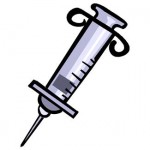Beyond Booster Shots: A Different Approach to the Sacraments
 During a recent debate caused by an article in Catholics News Agency, this humble journalist decided to take a different approach from the standard discussion, and planted his flag around a defense of the sacraments. While it might have been a curious defense, I hope to explain at least my reasons for doing so. Going forward, I think it is a powerful tool for the evangelization not just of those outside the Church, but of Catholics as well.
During a recent debate caused by an article in Catholics News Agency, this humble journalist decided to take a different approach from the standard discussion, and planted his flag around a defense of the sacraments. While it might have been a curious defense, I hope to explain at least my reasons for doing so. Going forward, I think it is a powerful tool for the evangelization not just of those outside the Church, but of Catholics as well.
As Catholics, we should have a special love and affection for the sacraments. While God provides grace through thousands of everyday situations, it is through the sacraments that he provides grace in a very special manner. He provides sanctifying grace that makes us holy and allows us to live a Christian life to the fullest. On this, anyone worthy of the name Catholic would agree.
Yet I think we Catholics approach the sacraments from a flawed analysis. We view them as mere “booster shots” for the already holy. So long as we are without mortal sin, we go to the sacraments, get our booster shot of infused grace, and we become holier. While there is certainly this aspect to the sacraments, there needs to be a lot more to the sacraments if we are taking the Biblical, historical, and magisterial evidence seriously.
Now if we all remember our catechism classes, we remember hearing that a sacrament is a visible sign conferring an invisible reality. This is certainly true, but not what I want to focus on. Now me, I slept through my Catechism class as a child, so thankfully I found the Catechism of the Catholic Church, which provides an explanation that, while not contradictory to the above definition, it goes in a different direction, one far more fascinating I would argue.
They [the sacraments] are “for the Church” in the sense that “the sacraments make the Church,” since they manifest and communicate to men, above all in the Eucharist, the mystery of communion with the God who is love, One in three persons. (Paragraph 1118)
Christ instituted the sacraments of the new law. There are seven: Baptism, Confirmation (or Chrismation), the Eucharist, Penance, the Anointing of the Sick, Holy Orders and Matrimony. the seven sacraments touch all the stages and all the important moments of Christian life: they give birth and increase, healing and mission to the Christian’s life of faith. There is thus a certain resemblance between the stages of natural life and the stages of the spiritual life. (Paragraph 1210)
From these paragraphs, I think we can come to a far deeper understanding of the sacraments, moving beyond the dogmatic textbook definitions to how those definitions matter in our everyday lives. From this, we can see that the sacraments, far from being just a booster shot, are essential activities for the Christian life. On the natural level, they serve as a remembrance (in the truest sense) of the communion we were originally called to have with God that was damaged by sin, and the way to which that communion is restored.
Yet the sacraments of the New Covenant go beyond this powerful means of salvation to provide something even greater. They not only call us back to the original calling Adam had, but they provide us something even greater than Adam ever possessed. This is what makes the sacraments so important to the Christian, yet it is the aspect I believe is least covered in catechesis and evangelization. I think this is a central problem facing Catholics today. If we examine our lives closely, we are not treating the sacraments the way the Catechism describes them. If we are lucky, we go to confession only if we screw up majorly, and then only to avoid hell. We go to communion to be fed by Christ, but we don’t do much to ponder the purpose of the sacrament. This needs to change. Hopefully in the future I can outline ways I think it needs to change, but most importantly I want individuals to talk amongst themselves (or even to themselves) about how we approach the sacraments, and where we can change and improve our approach.

